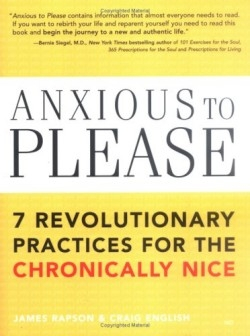It looks like you've stumbled upon a page meant to be read by our code instead of viewed directly. You're probably looking for this page.
Anxious to Please
7 Revolutionary Practices for the Chronically Nice
What’s so wrong with being nice? If America needs to recover from it, has the thirty-year preoccupation with Self-Help finally gone mental? Americans have devoured books on bad childhoods, good divorces, okay people, and ugly secrets. They’ve broken free, let go, overcome, and healed the shame, all one day at a time. Now, they’re being told to quit being nice? Being “nice” makes mothers beam; being “nice” smoothes out the scratches of daily life; being “nice” is rewarded with a gold star from the teacher and a discount on car insurance.
Beware the insidious spread of the Nice People epidemic, these authors say, for it can leave broken families, washed-up romances, bankrupt businesses, and dark clouds of anxiety in its wake. Politeness towards a surly co-worker and a genuine smile for the pizza delivery gal are just fine, but Nice People don’t stop there.
“They can’t quite help themselves,” write English and Rapson. “They have to be nice. They are nice whether it’s called for or not. They are nice when being ignored or even insulted. They are nice when they want someone (okay, everyone) to like them. They over-function, over-adapt, over-apologize.”
Childhood friends, these two authors know of what they speak. Rapson is a Belleview, Washington family therapist who draws on both clinical experience and academic scholarship. He founded programs such as Group of Dads, Couples in Motion, and The Shared Vision Project to help clients improve their human connections. English is a writer, actor, teacher, and lecturer who founded the popular “Commoners” writing group in Seattle, as well as helping start a Montessori middle school and a Shakespeare Theatre company. Together they use forty years of friendship and professional achievement to illuminate an overlooked problem faced by millions.
Anxious to Please details the symptoms of the Nice Person—constant worry, feeling sorry for yourself, taking what you’re given instead of asking for what you want, and being preoccupied with what others think. On the outside, the Nice Person is sunny and ingratiating; on the inside, a storm front is always moving in. Nice People, then, are the worst kind of doormat: The kind that throws itself under your feet, and then gets angry with you when you step on it with your muddy galoshes.
The clinical term for this problem is Adult Anxious Attachment. Why are there no twelve-step programs, 1-800 numbers, support groups, or telethons to raise money for research for this affliction, which, the authors say, touches thirty million people? Why have most people never even heard the term?
“The world is happy to have people who over-function and doesn’t mind that they are motivated by feelings of inadequacy,” write the authors. “In fact, many avenues of society rely on the mechanisms of guilt, shame, and fear to manipulate people, and Nice People are the ones most easily manipulated. … They often live what Thoreau called ‘lives of quiet desperation.’”
Much here has been stated in classic Self-Help books such as Co-Dependent No More and Beyond Co-Dependency by Melody Beattie, Getting the Love You Want by Harville Hendrix, and The Road Less Traveled by M. Scott Peck. New insights, specific exercises to identify and change problem behaviors, an inviting writing style, and well-organized text make this book entirely useful. Readers who found value in the above titles will refer to this more contemporary book again and again.
If you are a Nice Person, do not despair. By page seven in the Introduction, the authors give the reader a forecast for the calm and contentment ahead for those who choose to change from a Nice Person into a Transforming one. Transforming People, the authors write, have satisfying relationships, fulfilling sex, resilient self-esteem, and optimism for the future.
Anxious to Please includes examples of distorted behavior by Nice People and healthier behavior by Transforming People, and if there is a weak point of the book, it is here. All the examples work out perfectly. Communication is clear, people respect each other’s opinions, and at the end of the example, all is well. Not an accurate reflection of how change usually happens.
The way to become a Transforming Person is through acting on the seven practices, which each rate a full chapter in the book. These are: Awareness Practice, Desert Practice, Warrior Practice, Brotherhood and Sisterhood Practice, Family Practice, Disillusionment Practice, and Integration Practice.
The Transforming Person is someone who is “on the path from chronic niceness to a life of strength, kindness, and extraordinary passion.” Now, doesn’t that sound better than just being “nice”?
Disclosure: This article is not an endorsement, but a review. The publisher of this book provided free copies of the book to have their book reviewed by a professional reviewer. No fee was paid by the publisher for this review. Foreword Reviews only recommends books that we love. Foreword Magazine, Inc. is disclosing this in accordance with the Federal Trade Commission’s 16 CFR, Part 255.
